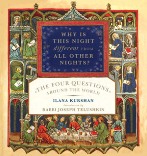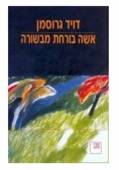Join a community of readers who are committed to Jewish stories
Sign up for JBC’s Nu Reads, a curated selection of Jewish books delivered straight to your door!
Posted by Naomi Firestone
 While in Israel last month for Jerusalem International Book Fair, I had the pleasure of spending time with Ilana Kurshan. Ilana, a foreign rights agent for the Deborah Harris Agency in Jerusalem, has studied history of science and English literature at Harvard and Cambridge universities, and has worked in the editorial department at Alfred A. Knopf and Schocken Books in New York. Ilana is also the author of Why Is This Night Different from All Other Nights?: “The Four Questions” Around the World, published last year (and a great edition for your Passover Seder this year). In addition, she is the books editor at Lilith Magazine. Ilana has graciously offered to contribute this guest blog post for our readers…
While in Israel last month for Jerusalem International Book Fair, I had the pleasure of spending time with Ilana Kurshan. Ilana, a foreign rights agent for the Deborah Harris Agency in Jerusalem, has studied history of science and English literature at Harvard and Cambridge universities, and has worked in the editorial department at Alfred A. Knopf and Schocken Books in New York. Ilana is also the author of Why Is This Night Different from All Other Nights?: “The Four Questions” Around the World, published last year (and a great edition for your Passover Seder this year). In addition, she is the books editor at Lilith Magazine. Ilana has graciously offered to contribute this guest blog post for our readers…
Fleeing the News
 This is an article about a book I have not read. This may at first seem surprising. How much can I possibly have to say about a book I have never opened? I am reminded of a phrase that my friends in the publishing world coined to refer to books they had read and talked about, but had not read. This phrase is “reading around.” To “read around” a book is to read the reviews, to read the flap copy and the blurbs and perhaps even an interview with the author, all without actually reading the book itself. This is the situation I am in, right now, with David Grossman’s new novel Isha Borachat Mibsora [A Woman Flees the News].
This is an article about a book I have not read. This may at first seem surprising. How much can I possibly have to say about a book I have never opened? I am reminded of a phrase that my friends in the publishing world coined to refer to books they had read and talked about, but had not read. This phrase is “reading around.” To “read around” a book is to read the reviews, to read the flap copy and the blurbs and perhaps even an interview with the author, all without actually reading the book itself. This is the situation I am in, right now, with David Grossman’s new novel Isha Borachat Mibsora [A Woman Flees the News].
When I first heard about Grossman’s new book, I was determined not to read anything about it. A book by one of Israel’s most famous living writers was bound to get a lot of press coverage, and I wanted to discover it for myself. I remember how frustrated I was when I sat down to read Grossman’s earlier bookSomeone to Run With only after reading half a dozen articles about the novel’s political allegory, which then colored my own reading experience. This time, I would not make the same mistake.
 And so, like the title character of Grossman’s novel, I was Isha Borachat Mibsora – I was a woman fleeing the news. I quickly turned the page over when I saw the reviews in the Haaretz newspaper, and I would turn the dial on the radio whenever an ad for the book came over the air. (I do not remember this being the case in America, but in Israel, newly-published books are advertised on the radio – a bit of plot summary, some praise for the auther, and then a closing statement urging the listener to go out to his/her nearest bookstore to find out what happens next…..) But no one can hide from the news, as Grossman’s heroine probably learns as well. Despite my best efforts, the news reached me.
And so, like the title character of Grossman’s novel, I was Isha Borachat Mibsora – I was a woman fleeing the news. I quickly turned the page over when I saw the reviews in the Haaretz newspaper, and I would turn the dial on the radio whenever an ad for the book came over the air. (I do not remember this being the case in America, but in Israel, newly-published books are advertised on the radio – a bit of plot summary, some praise for the auther, and then a closing statement urging the listener to go out to his/her nearest bookstore to find out what happens next…..) But no one can hide from the news, as Grossman’s heroine probably learns as well. Despite my best efforts, the news reached me.
Grossman’s new novel, I have learned, is about a love triangle between two men and a woman: Avram loves Ora, Ora loves Ilan, and the two men are close friends. They first meet in 1967 at age sixteen in an abandoned hospital in Jerusalem. Their bonds strengthen over the next few years, climaxing in the days leading up to the 1973 War, when Ilan and Avram are both stationed near the Suez Canal. Avram is captured and returns back a different man; Ilan marries Ora and gives her a son, but he is ultimately so overcome by survivor’s guilt that he is unable to function. Ora has a second son named Offer, the product of a one-night-stand with Avram, whom Ilan raises as his own. All this is the background, relayed through flashback. In the present, set during a large military operation in the West Bank, Ora sends her son Offer to war, and then flees to the Galilee. She is convinced that her son is about to die, and does not want to be there when the army’s messengers come to knock on her door.
Given that this is such an Israeli novel, I at first thought I would read it in Hebrew. After four years of living in Israel, I finally began reading novels in Hebrew five months ago, when I joined a Hebrew book club. But Grossman’s novel is over 600 pages, and in our book club we average about 150 pages a month. (It generally takes us two months of biweekly meetings to get through an entire book.) It is unlikely that I’d be able to convince my book group to take on such a weighty tome, and I doubt I’d have the stamina on my own.
 Still, I lingered by the stand of Grossman’s publisher Hakibbutz Hameuchad at Shvua HaSefer (Hebrew Book Week), a week-long celebration of Hebrew books. During Shvua HaSefer, all the major cities in the country have fairs where publishers set up stands and sell their new wares at significant discounts. In Jerusalem, Shvua HaSefer is held at the old train station, an otherwise-empty courtyard that is sandwiched between two busy streets but sheltered from the noise and the traffic by high fences and tall trees. I have been there every night this week, wandering around from stall to stall to look at Hebrew picture books, cook books, new books on Talmud and Jewish philosophy, and even Hebrew study guides to American classics like Tom Sawyer and To Kill a Mockingbird.
Still, I lingered by the stand of Grossman’s publisher Hakibbutz Hameuchad at Shvua HaSefer (Hebrew Book Week), a week-long celebration of Hebrew books. During Shvua HaSefer, all the major cities in the country have fairs where publishers set up stands and sell their new wares at significant discounts. In Jerusalem, Shvua HaSefer is held at the old train station, an otherwise-empty courtyard that is sandwiched between two busy streets but sheltered from the noise and the traffic by high fences and tall trees. I have been there every night this week, wandering around from stall to stall to look at Hebrew picture books, cook books, new books on Talmud and Jewish philosophy, and even Hebrew study guides to American classics like Tom Sawyer and To Kill a Mockingbird.
It is a rare opportunity to see such a high concentration of new Hebrew books in one place, because the bookstores in Israel are quite small. Most are one room (not to mention one story), and there is no café or even a place to sit down. (Steimatzky’s once tried selling coffee. I saw an ad about it in the paper, and went into the shop to see what it was all about. To my utter shock, they were selling jars of instant Elite ground coffee!! Apparently, some businessman had tipped them off to Barnes and Noble’s success, but not provided the full story…..) I consider myself lucky if I can maneuver in a Steimatzky’s shop without knocking a few books off the shelf with my bulky backpack. At Shvua HaSefer, there is always enough room to move around, and never enough time to see all the books on display.
I flipped through David Grossman’s novel each time I visited his publisher’s table, but finally decided that I would wait until the English translation comes out. This will not be for at least another two years, since the English rights have not been sold. (I know this because David Grossman’s agent, who is auctioning the book right now, is my boss.) So I am in that awkward period now of waiting for a book that is already out to come out in another country in my language.
 Generally, I am in the opposite place. I am usually waiting for books I have already read in English to come out in Hebrew. My job as a literary agent in Israel is to sell translation rights to publish books in Hebrew. This means that I work with all the major publishers around the world to find publishers in Israel. Once I sell a book and draft the contract, it usually takes about two years before the Hebrew edition is published. According to the terms of the contract, the Israeli publishers are obligated to send us two gratis copies of the finished product. And so we have a shelf in our office with Hebrew editions of Dara Horn’s In the Image, Randy Pausch’s The Last Lecture, and even the complete annotated Wizard of Oz, to give just a few examples.
Generally, I am in the opposite place. I am usually waiting for books I have already read in English to come out in Hebrew. My job as a literary agent in Israel is to sell translation rights to publish books in Hebrew. This means that I work with all the major publishers around the world to find publishers in Israel. Once I sell a book and draft the contract, it usually takes about two years before the Hebrew edition is published. According to the terms of the contract, the Israeli publishers are obligated to send us two gratis copies of the finished product. And so we have a shelf in our office with Hebrew editions of Dara Horn’s In the Image, Randy Pausch’s The Last Lecture, and even the complete annotated Wizard of Oz, to give just a few examples.
Now the tables are turned, and I wait for a Hebrew book to come out in English. Perhaps it will be ready by the next time I travel to America, so I can sit in a big comfortable armchair in Barnes and Noble, lean back with a cup of steaming cappuccino, and discover the news for myself.
Ilana Kurshan is a graduate of Harvard and Cambridge. She has worked in literary publishing both in New York and in Jerusalem as a translator and foreign rights agent and as the books editor of Lilith magazine. Her writing has appeared in Tablet, Lilith, Hadassah, The Forward, Kveller, The World Jewish Digest, Nashim, and The Jewish Week. She lives in Jerusalem with her husband and four children.